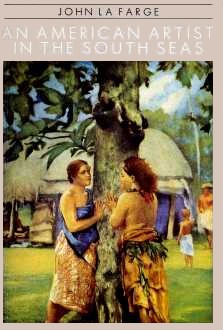|
An American artist
in the South Seas / John La Farge ; introduction by Kaori
O'Connor. - London, New York : KPI, 1987. - XIX-480 p.-pl. :
ill. ; 24 cm. - (Pacific basin books).
ISBN 0-7103-0256-8
|
En 1890 et 1891, le peintre américain
John La Farge et son ami Henry
Adams parcourent le Pacifique : Hawaii, Samoa, Tahiti et
les Fidji 1.
Ils quittent Tahiti le 5 juin
1891, à bord du Richmond ; quatre jour plus
tard, au matin, la Vire entre en rade de Papeete avec
à son bord Paul Gauguin.
Des années plus tard,
dans une lettre à Henry Adams, John La Farge
parle de Gauguin : « I say wild Frenchman, I should say stupid Frenchman. I mean Gauguin. […]
He went into the wilderness and lived the simple life — the
coconut and breadfruit life — with some relative companion
to charm the simplicity of food etc. All that seemed natural
enough ; stupid enough ; and yet there was something
of the man who had found something. » 2
Le rendez-vous manqué
entre Gauguin et La Farge à Tahiti pourrait avoir
valeur de symbole ; pourtant la dernière phrase du
peintre américain sonne comme un aveu : La Farge
a-t-il pressenti la nature, et l'importance, de ce « quelque-chose »
que Gauguin pourrait avoir trouvé ?
|
HENRY ADAMS : Quant à [John La Farge],
je pense qu'il rapportera beaucoup d'œuvres nouvelles […]. Le
seul fait troublant est de penser qu'aucun peintre jusqu'à
aujourd'hui n'ait entrepris de capter sur sa toile les lumières
et les couleurs de cette île ; j'en ai suffisamment
appris pour savoir ce qui ne peut être rendu au pinceau,
mais La Farge fait d'étonnantes tentatives empourprées
pour y parvenir, tout en sachant combien il est absurde d'essayer.
☐ Lettres
des mers du Sud (1890-1891), p. 37
|
|
PUBLISHER'S DESCRIPTION : The American artiste John La Farge
(1835-1910) preceded Gauguin to the Pacific, and in their time
his reputation as the modern Pacific painter far overshadowed
that of the Frenchman. This remarkable work is the record of
a year-long artistic odyssey through the South Seas, during which
La Farge braved the volcanoes of Hawaii, visited Robert Louis
Stevenson in Samoa, was adopted by a noble Tahitian family and
journeyed through the wild hills of Fiji, painting and sketching
lyrical studies of island life that won him acclaim in the salons
of Europe and America. Lavishly illustrated with his work, this
account of Polynesian adventures that La Farge shared with his
friend the historian Henry Adams is an important contribution
to the literary and artistic heritage of the Pacific, and a revealing
insight into the life of a complex and fascinating man.
|
| COMPLÉMENT BIBLIOGRAPHIQUE | - John La Farge, « Reminiscences
of the South seas », Garden City (N.Y.) : Doubleday,
Page & Co., 1912 ; London : Grant Richards, 1914
| - John La Farge, « Tahitian
literature. The Teva poets : Notes on a poetic family in
Tahiti » in Charles Dudley Warner (ed.), A library of the world's best literature ancient and modern, vol. XXXVI, New York : The International society, 1897
| | - Elisabeth
Hodermarsky, « John La Farge's second paradise :
voyages in the South Seas, 1890-1891 » with essays by
Elizabeth C. Childs and John Stuart Gordon, New Haven : Yale
university press, 2010
- James L. Yarnall, « Recreation and idleness : the Pacific travels
of John La Farge », New York : Vance Jordan
Fine Art, 1998
- James
L. Yarnall, « John La Farge, a biographical and critical
study », Farnham (England), Burlington (Vermont) :
Ashgate, 2012
|
|
|
| mise-à-jour : 25 octobre 2017 |

| |
|